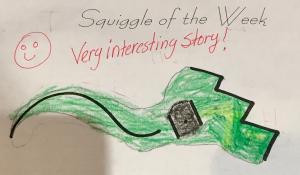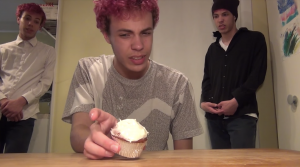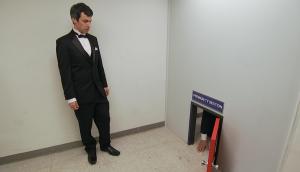I’ve always sort of enjoyed writing papers… but I often don’t enjoy looking back at them. I’m usually proud of my work immediately once it’s done, but my opinion slowly sours as I notice things I could change, or I begin to disagree with myself. Even so, I think there’s value in looking back, and I recently decided to look back through my 14 years of schooling and the papers that came out of them.

I asked my mom to send me some of my early essays so I could see the changes in my writing, and she sent back this moving story from a “Squiggle of the Week,” a kindergarten assignment in which I was given a squiggle to draw a picture around and then tell a story about: if you read JimY and You liked jimY You will ProBlBly like him. He’s his BroTher. TheY missed echother he wantid to get to his Brother he Did But it took him a lonG time.
My elementary school writing gradually gained some level of coherence, but it remained unstructured and messy. Then with middle school came the development of structure. In looking back at one of my middle school essays, the building blocks I was learning are very apparent. There’s the gripping intro: Imagine a future with no new art. There are no logos, cartoons, or book covers. There are no posters, costumes, or paintings. All houses look the same. There are no comics in the newspaper. The three-point thesis, laying out each body paragraph: Timberlane Middle School should not cut art classes because art could be important to the students’ futures, having art classes could allow students to be creative, and teachers could lose their jobs. And the dramatic, full-circle conclusion: Imagine a world with no art. It’s worse than it may sound. I mean... it already sounds pretty bad!
Reading my high school essays, I start to recognize more of my own voice and interests. One essay compared Pride and Prejudice to its vlog-style adaptation The Lizzie Bennet Diaries, exploring how both work, in different ways and different formats, to invite audience engagement and dialogue surrounding social norms. The essay feels in line with my interests now, exploring the gendered implications of Pride and Prejudice’s story, relevant to my major of sociology, as well as the artistic effects of Lizzie Bennet’s vlog style and social media use, relevant to my minor of media arts and design.

Then, there were my college application essays, which, though this might seem surprising if you’re currently in the midst of application season, I actually look back on quite fondly! My favorites were my personal essay, which laid out a sort of thesis for my life at that point: the value in embracing uncertainty, and the ability to find community from it. And my Uncommon Essay, in which I discussed abandoned creative projects I had gone back to square one on, like a YouTube series in which I cloned myself nine times. (As it turns out, editing nine clones of yourself into the same shot is very hard to do…)
Then came college! My first college paper was a close reading of Ovid’s The Metamorphoses for my humanities course Reading Cultures. I remain quite pleased with its title, "A Monument That Always Will Endure": The Grave Punishment of Phineus’s Immortality. The word “grave” there has a double meaning, as it describes a character who is punished by being turned to stone, with the frozen statue of his body acting as his own grave. And the careful word choice also resonates with what I learned from the paper, the meaning that can emerge by paying close attention to word choice and its connotations.
I am much less pleased with the title of my first paper for my social science course, Freedom and the Free Market: Synonymous or Antithetical. Comparing the ideas of Adam Smith and Karl Marx, the paper was still valuable in helping me analyze the structure of my society… I just really regret not titling it Freedom and/or the Free Market.
Then there are the papers from my first year at college that eventually convinced me to major in sociology. In writing a paper on the rise of mechanized clock time, I explored how the structure of society shapes our daily perceptions of reality through the historical shifts in our time-sense. And in writing a paper on Banksy’s documentary Exit Through the Gift Shop, I thought about the symbolic meanings of people’s behaviors by analyzing street art as storytelling.

In college, I’ve been able to follow more of my own interests and passions through my essays, which is freeing. I’ve written papers on current social issues, 1980s drag culture, and the Comedy Central show Nathan For You (which, it’s occurring to me, I’ve now mentioned in two of my last three Uncommon Blog posts… It’s just really good, okay?).
Looking back at these papers, I often feel embarrassed. There’s that cringe that comes from simultaneously knowing that I wrote them but also not really feeling like they’re me. But it’s interesting to see my current self emerge through them. As my thinking has become more organized, my papers have become more structured. And my ideas have developed through the process of writing and revising. I’m sometimes uncomfortable looking back at my papers, but it’s cool to have these looks back at myself and my thinking, and to be able to see how I’ve changed through the changes in my writing.